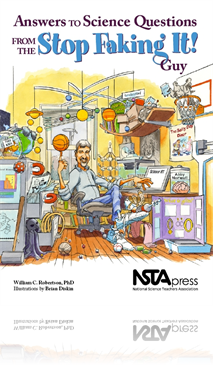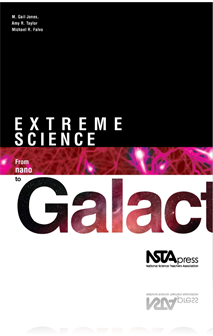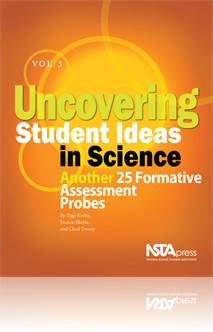All Book Chapters
Book Chapter
Is It Possible to Turn Coal Into Diamonds?
How cool would it be to be Lois Lane? Anytime she wants a diamond, she just has Superman use his super strength to squeeze a lump of coal. But is this really possible? Using a high enough temperature and enough pressure, can you turn coal into diamo...
Book Chapter
Scale is one of the big ideas that cross the science domains. Whether one is talking about the weight of a blue whale, the size of a galaxy or a molecule, or the age of a mountain range, scale is an essential tool in understanding the universe in a s...
Book Chapter
The purpose of this assessment probe is to elicit students’ ideas about thermal expansion. It is designed to find out whether students attribute expansion of the space between molecules to the rise of the liquid in a thermometer. Elementary school ...
Book Chapter
The purpose of this assessment probe is to elicit students’ ideas about the mass of a gas. It is designed to reveal whether students recognize that an uninflated balloon will increase in mass when inflated with a gas, even though the balloon intuit...
Book Chapter
The purpose of this assessment probe is to elicit students’ ideas about conservation of matter. It is designed to reveal whether students recognize that the mass of a warm gas in a closed system is the same after it has been cooled, even though the...
Book Chapter
The purpose of this assessment probe is to elicit students’ ideas about reflection of light. It can be used to examine how students use ideas about light to explain how we see objects in a mirror. Elementary school students investigate reflection o...
Book Chapter
The purpose of this assessment probe is to elicit students’ ideas about complete circuits involving lightbulbs. It reveals whether students recognize the pathway of electricity in a complete circuit, including its path through a lightbulb, in order...
Book Chapter
The purpose of this assessment probe is to elicit students’ ideas about forces. It is designed to find out whether students recognize that balanced forces act on a stationary object. It is most appropriate for middle and high school students. Eleme...
Book Chapter
The purpose of this assessment probe is to elicit students’ ideas about circular motion. It is designed to determine whether students recognize that an object will move in a straight line unless acted upon by an outside force. Elementary students m...
Book Chapter
The purpose of this assessment probe is to elicit students’ ideas about falling objects. It is designed to find out if students think the weight or mass of an object affects how fast it falls. For elementary students investigations of the motion of...
Book Chapter
The purpose of this assessment probe is to elicit students’ ideas about the nature of science. It is designed to find out if students distinguish scientific theories from the common use of the word theory and if they understand how theories differ ...
Book Chapter
The purpose of this assessment probe is to elicit students’ ideas about scientific investigations. It is designed to find out if students recognize that scientists investigate the natural world in a variety of ways depending on the question they po...
Book Chapter
The purpose of this assessment probe is to elicit students’ ideas about hypotheses. It is designed to find out if students understand what a hypothesis is, when it is used, and how it is developed. Elementary students typically engage in inquiry to...
Book Chapter
The purpose of this assessment probe is to elicit students’ ideas about life cycles. The probe can be used to determine whether students recognize that although life cycles vary in length and developmental stages, all multicellular organisms go thr...
Book Chapter
The purpose of this assessment probe is to elicit students’ ideas about the size of cells. It can be used once students understand that all organisms are made up of cells and to determine whether students recognize how small a cell is relative to o...




